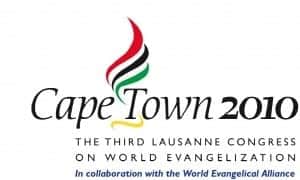
Make disciples of all nations. This is Jesus’ main command in the Great Commission, and for the last 2000 years it has been the mission of the Church. As the world has become easier to traverse, the gospel is moving to the far corners of the world. It is for the cause of world evangelization and being faithful to the commandments of Jesus that the Lausanne Movement started in 1974. Its goal has been to bring evangelical leaders together from around the world to address the issues facing the church as we seek to be faithful to Jesus’ commission to the church..
The congress begins this next week and runs from October 17-25 in Cape Town, South Africa. A select 5,000 delegates will attend, with the clear majority coming from the non-Western church. I am excited to be going, along with Chancellor-Elect Dr. Mike Milton and Dr. Elias Medeiros, RTS Jackson professor, who will participate in a multiplex session and lead a dialogue session. His presentation is titled, “Ministering to the Scattered Peoples.”
The Lausanne Congresses are the closest thing evangelicals have to a church council. Rome holds Vatican Councils. The World Council of Churches holds its large assemblies. Evangelicals have Lausanne. This movement was started in the 1960s with a Berlin Congress. But it took formal shape in 1974 when the first Lausanne congress was convened by Billy Graham, John Stott and others in order to mobilize the global church for evangelism.
Its current leaders hope to see the gospel of Jesus Christ taught and applied more effectively in all contexts. Their passion has been to see a new and urgent commitment to world evangelization by “the whole church, to take the whole gospel into the whole world.” The hope is that the church will have new commitment, new courage, as well as new strategies and partnerships to fulfill the Great Commission.
Why another large council? Councils arise out of new situations that the church finds itself in. It has always been that way. The early church councils arose because of some new challenge to the church—the rise of Arianism, or Pelagianism, or the Christianization of the Roman Empire.
Think of how the world has changed since the last Lausanne Congress in 1989. We have seen the collapse of communism, the unbottling and radicalizing of Islam, the wiring of the world through the internet, the acceleration of globalism and urbanization, the continued growth of mega cities, the shifting of the center of Christianity from the West to the South and the East. Each of these changes has brought new challenges to the church. A congress like this gives Christian leaders an opportunity to confess their faith (the uniqueness of Christ and the abiding importance of his cross and resurrection) in a new cultural situation.
The Lausanne gathering also provides an opportunity for building relationships and partnerships among Christian leaders. Now more than ever, in this global age, we must work together to proclaim Christ and fulfill the Great Commission.
Finally, a council like this highlights the shifting leadership in the church. Billy Graham and John Stott are passing from the scene. Dr. Graham and Dr. Stott are now both frail, and the Congress highlights the passing of the Christian torch to a new generation of leaders.
This council will highlight the importance of evangelism and strategies for reaching all kinds of people. It will focus on some of the things that need to be fixed in the church in order for our witness to be more credible. Its members will consider how to reach the yet unreached people groups of the world, as well as challenge participants to a new courage in order to proclaim our faith in an increasingly hostile world.
There are many different ways that you can take part along with Drs. Milton, Sweeting, and Medeiros:
After the congress, we at RTS in Orlando plan to host a forum with me and other attendees about what the congress accomplished and what they learned as they interacted with other leaders of the global church.
Don’t miss this rare opportunity to join with us in the conversation on global evangelization in your generation.
